Using molecular and stable isotope approaches to investigate sea turtle foraging ecology in the Western Indian Ocean
Sophia Coveney
Swansea University, Wales, UK
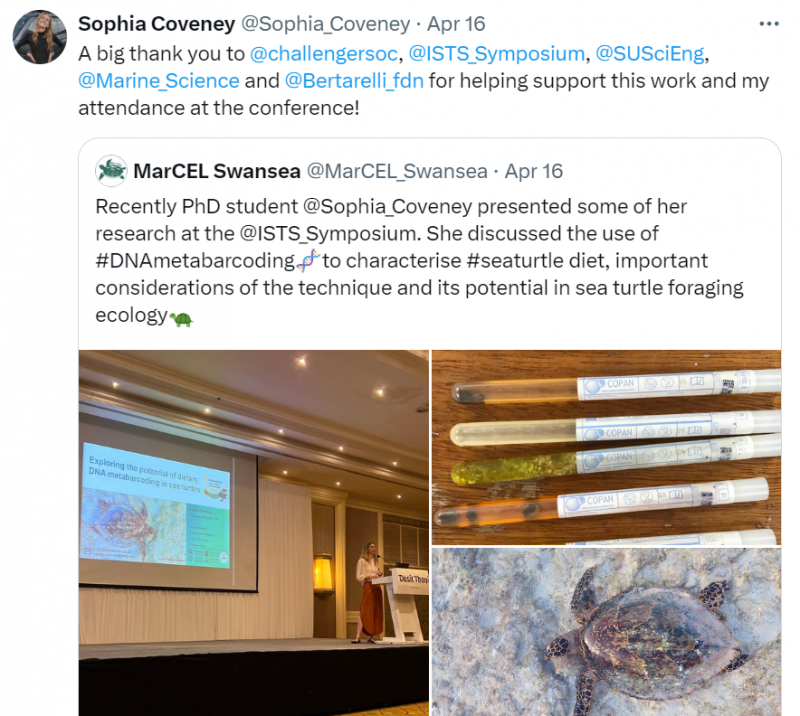
In March 2024, I attended the 42nd International Sea Turtle Symposium (ISTS) in Pattaya, Thailand. The ISTS meetings are a busy week of workshops, talks and socialising amidst the largest aggregation of sea turtle researchers, practitioners and industry partners.
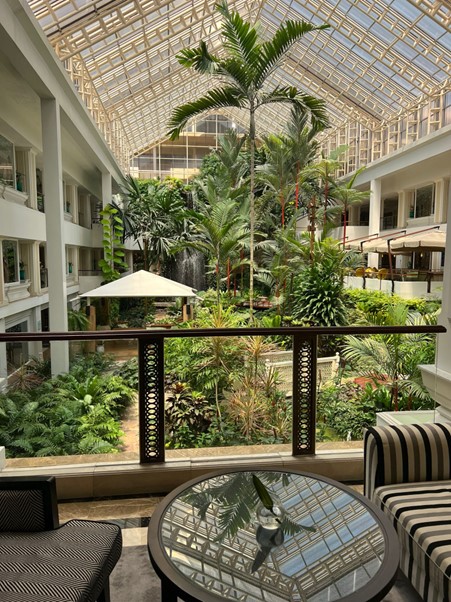
Before the conference starts, ISTS hosts workshops and regional meetings in which attendees can develop their skills and communicate with others working on sea turtles in their region. This year, there was a day of workshops and a day of regional meetings. I chose to attend the “Sea Turtle Rehabilitation and Medicine” workshop. As well as having an interest in sea turtle veterinary science, having been part of a team rehabilitating a very injured sea turtle in the past, I hoped to do some networking and gain some insights on the possibility of controlled feeding studies for my PhD. The workshop was fascinating, and its theme was an incredibly important one. The presentations focussed on case studies that had gone wrong, aiming to provide a space where veterinary practitioners could advise on what might have caused an undersirable outcome and what everyone could learn from a particular case. Across science, people are rarely given a platform to speak about what has gone wrong, despite the fact that this can really help encourage progress, so it was refreshing to see a workshop providing this outlook.
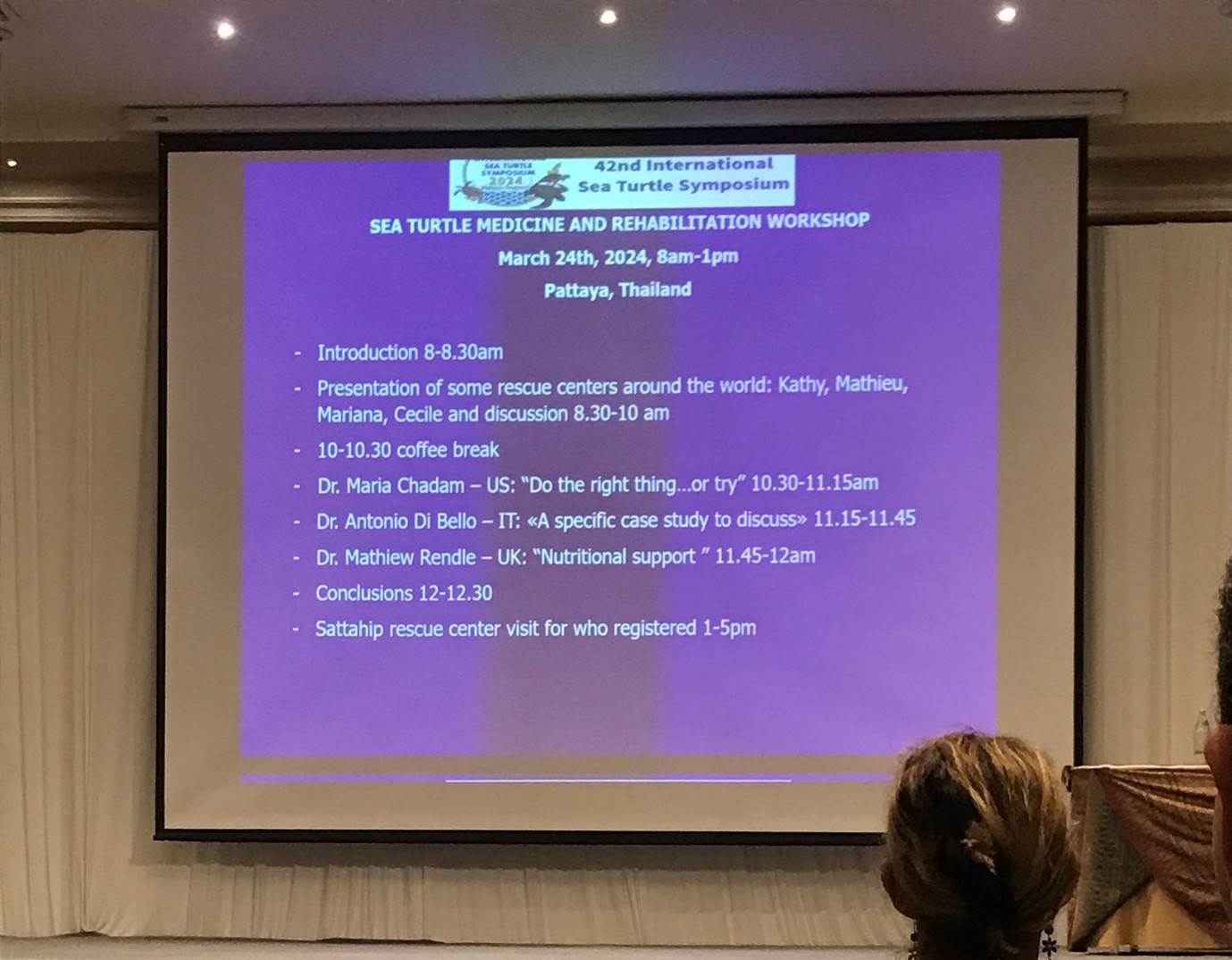
Once the conference began properly, it was a nonstop itinerary of talks, activities and social events. There was a huge variety of oral presentations and posters, covering everything from community and cultural-based sea turtle research to toxicology. On the second day of talks, I gave my presentation on using dietary DNA metabarcoding in marine vertebrates. As I am at the start of my PhD, I presented the results of my literature review, highlighting the limited number of sea turtle studies and discussing how the technique could help the field move forward. I was happy to have an engaged audience who asked some important questions and expressed interest afterwards.
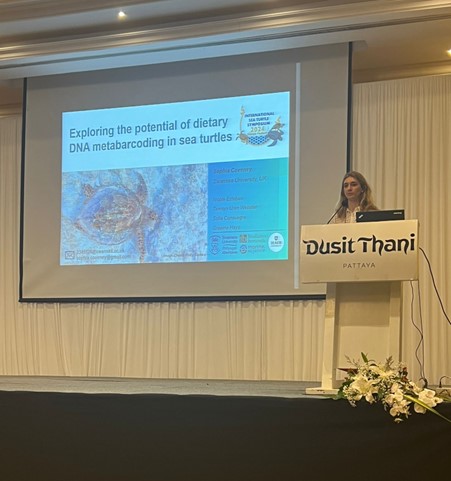
ISTS facilitated a welcoming environment for networking and meeting people who you may have previously only met on a screen or even as a name in a journal. A student mixer and welcome social on the first evening allowed everyone to get to know each other, silent and live auctions throughout the week enabled the committee to raise money for next year’s student travel grants, and a banquet dinner on the last evening allowed everyone to celebrate a successful week. In particular, the conference provided an inclusive space for students with a student committee working hard to put on events like the student mixer and a ‘speed-chatting with experts’ session. Student travel grants enabled successful applicants to stay in the conference hotel free of charge (and enjoy a huge buffet breakfast every morning). I was immensely grateful to receive a grant this year.
Although the conference was very busy, we still found a few spare hours to explore Thailand. Most evenings we headed to the local street food markets for tea. Outside of the conference, I took advantage of being in an area with such a beautiful marine environment and went on some long overdue scuba dives, completing my Advanced Open Water qualification. I saw some of the amazing marine life Thailand has to offer (including, of course, a green turtle!).
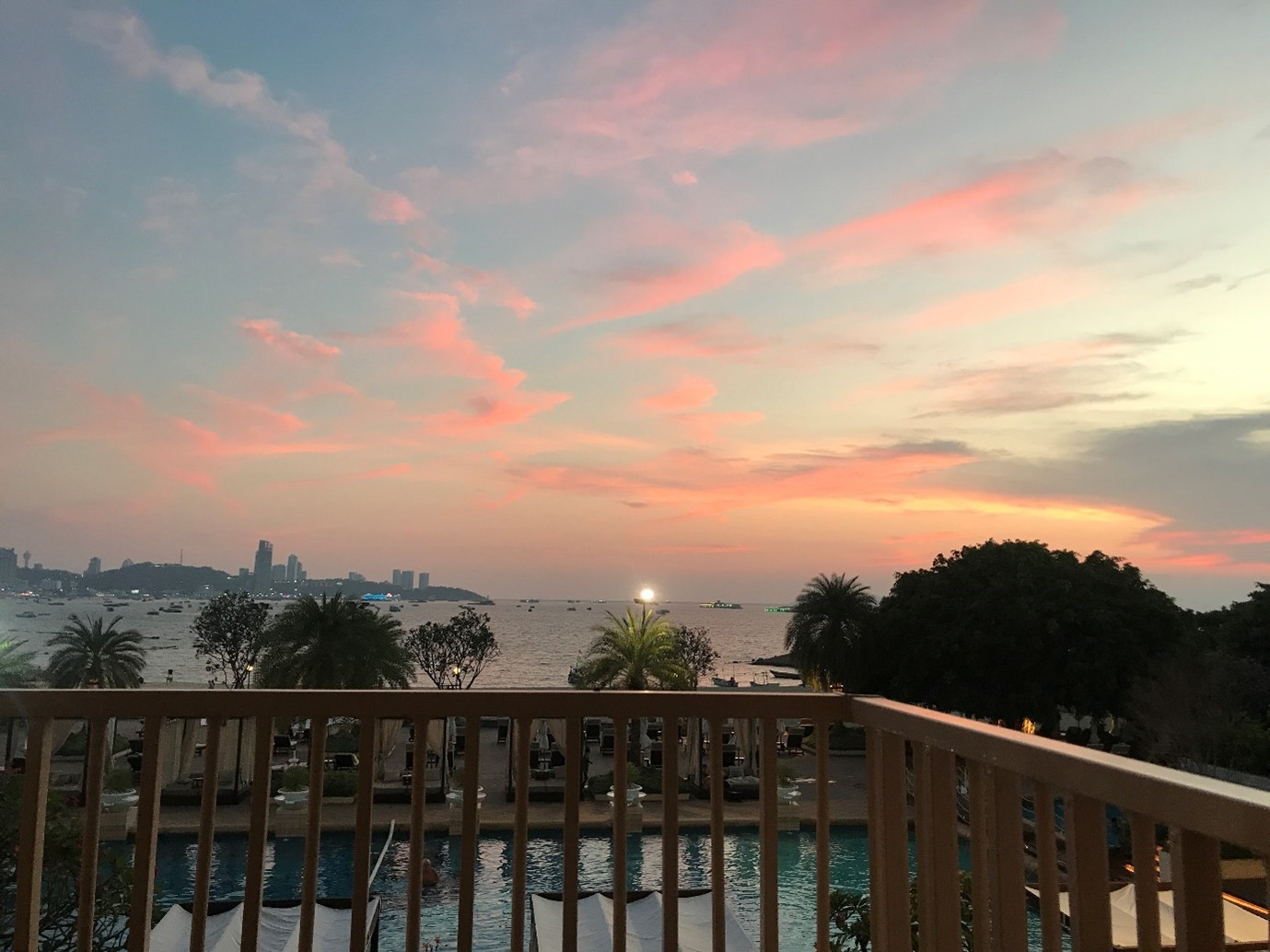
Sophia is a marine molecular ecologist studying for her PhD at Swansea University in association with Marine.Science. Her work uses DNA metabarcoding, microbiome characterisation and stable isotope analysis to investigate sea turtle diet in the Western Indian Ocean. She is hoping to contribute to optimising methodology, helping to guide further molecular study of sea turtle foraging ecology.
X: @Sophia_Coveney
Instagram: @thalassophia_science
Webpages: https://www.marine.science/scientist/coveney-sophia/
Latest News
Marine Data Management, Governance and the MEDIN toolset
The Marine Environmental Data and Information Network (MEDIN) and OceanWise are delighted to invite you to attend our popular free online training workshop: ‘Marine Data Management, Governance and the MEDIN toolset’ on the 19th – 23rd of May 2025.
Workshop on the contribution of UK Arctic Ocean science to the International Polar Year 32/33
12:00 11th June – 16:00 12th June 2025: NOC Southampton (In-person with online option): Registration deadline 16th May
REGISTER HERE
Pre-meeting questionnaire (open to all)
The purpose of this workshop is for the UK Ocean Science community to discuss and then draft a prospectus document outlining the priority Arctic research questions the community would like to address during the run up to, throughout and beyond the International Polar Year 32/33. Additionally, to identify what unique strengths and technologies the UK has to help fill these knowledge gaps.
The second day of the workshop will be dedicated to writing groups, one for each of the priority research questions identified - from both the pre-meeting questionnaire (HERE) and day one discussion. By the end of the meeting, each group will have produced draft text and sourced supporting figures for the prospectus.
Post meeting, the draft will be opened for comments and suggestions from everyone, regardless of whether they were able to attend the workshop or not. It will then be shared with UK funders (UKRI, FCDO, DSIT, ARIA) and potential international programmes with whom we would like to collaborate (e.g. Arctic 2050, Norway). It will form a basis from which wider integration with terrestrial, atmospheric and cryosphere communities can be built, e.g. at the UK Arctic Science Meeting in September in Northumbria.
To ensure balanced community and ECR representation, and to ensure that the size of the writing groups is efficient and effective, if the number of registrations from individual institutes becomes overwhelming, we may contact individuals or teams and ask that each institute selects a smaller number of individuals to attend in-person. Please wait for confirmation of in-person attendance before finalising travel arrangements.
The workshop will be open to hybrid attendance and contributions on both days.
Challenger Society Council Position Vacancy
The Challenger Society for Marine Science (CSMS) are pleased to announce an exciting opportunity to support the next generation of ocean scientists and innovators. CSMS are looking for a new Council member to fill the Student Travel Awards and Stepping Stones Portfolio. The successful applicant will administer the travel and research grants available for Early Career Researchers.
The role involves:
- Receiving applications for the two schemes and responding to applicant inquiries
- Soliciting and compiling input from the rest of the Council for assessing the applications
- Communicating with successful and unsuccessful applicants for the two schemes
- Working with the Honorary Treasurer on allocating funds to successful applicants
- Following up with award winners on their reporting requirements
- Attending Council meetings four times a year (in person or online) and contributing to discussions and decision making for CSMS
The usual term for Council members is three years.
For more information about the CSMS Council, please follow this link: https://www.challenger-society.org.uk/The_Council
For more information about our Early Career Researcher grants and awards, please follow this link:
https://www.challenger-society.org.uk/Stepping_Stones
and
https://www.challenger-society.org.uk/Travel_awards
If you are interested in applying or have any questions regarding the role, please contact kathen@bas.ac.uk
